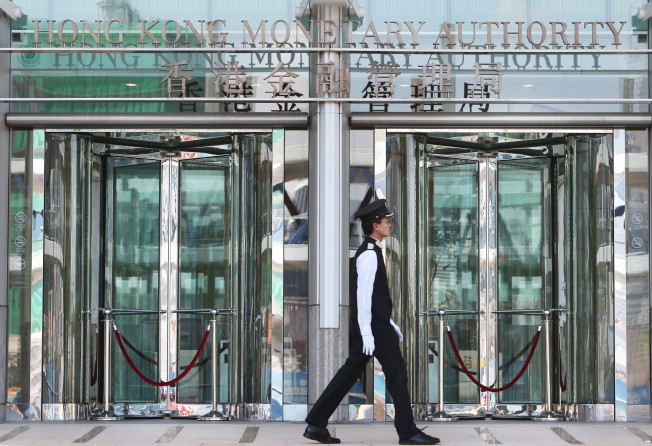HKMA likely to miss FSB deadline for crisis management plan
Regulator is under pressure to finalise banking crisis management plan as FSB deadline looms

Hong Kong's de facto central bank carries the weight of the financial universe on its shoulders.
Even if the Hong Kong Monetary Authority's domestic banks are minor players in the global market, for its size the city has an almost unmatched concentration of international banking heavyweights within its borders. Twenty-seven out of 30 of the globe's most systemically important banks, as identified by the Financial Stability Board, have branches or subsidiaries here.
HSBC and Standard Chartered, two of the world's biggest banks, call Hong Kong a home away from home. Then there's the mainland's superbanks expanding southward.
These give the HKMA all the more reason to be clear on how it would manage a domestic bank run or a global financial shock that ripples through foreign bank branches. The problem is, the current regulatory fallback is wanting and the HKMA could turn up late as banking regulators the world over make known their strategies for the next global financial crisis.
In accordance with the Financial Stability Board, the HKMA in January issued a consultation paper on what's known as a "resolution regime for financial institutions". The paper sought public comment on the regime and noted it would issue a second paper before the end of the year before tabling the act in the legislature next year.
The HKMA will likely miss that soft deadline. A spokesperson from the regulator told the South China Morning Post that it was close to finalising the paper but expected to issue it in January for a three-month consultation period.
The delay raises questions over whether Hong Kong can get the regime in place in time to meet the final FSB deadline at the end of next year.
"The real problem is getting the time in the legislature to enact this," said Mark Hyde, head of the Asia finance practice at law firm Clifford Chance. Without the second consultation paper this year, the HKMA would struggle to get the primary legislation needed to finalise the regime.
The number of major global banks in Hong Kong not only makes the regime more urgent, it also complicates the matter because Hong Kong's crisis resolution will be expected to dovetail with the plans in the home jurisdictions of the global banks.
This has likely lengthened the resolution drafting process.
The HKMA has proposed that it will strengthen its powers for resolving problems at the foreign bank operations in Hong Kong, said Derek Ovington, a banks analyst at CLSA Asia-Pacific Markets in Hong Kong. Yet, in the event of a crisis, these resolutions will rely heavily on the home regulators, an approach favoured by the FSB.
"The issue is complicated and messy for HKMA as so many of the large market participants here are foreign banks where the lead regulator is in another country," Ovington said.
Another factor was the need to coordinate with the mainland on devising a resolution. Hyde said the HKMA would have to strike a "delicate balance" between international standards while not straying too far from the regime that the China Banking Regulatory Commission is currently drafting.
But the mainland's banking system was much larger and in need of a more-powerful resolution compared to Hong Kong, said Spark Wang, a regulatory intelligence expert at Wolters Kluwer Financial Services in Shanghai. Hong Kong's financial sector, on the other hand, was more sophisticated and open to the free market, traits that would make cooperation between the CBRC and HKMA difficult for the time being.
"In the long run, a single resolution mechanism for both China and Hong Kong, just like that of the European Union, is probable," Wang said. "But this will not happen quickly."
Time is of the essence. As it stands, Hong Kong's tools for dealing with a full-on banking crisis were lacking , experts said.
The jurisdiction has an outdated bankruptcy law which surprisingly had yet to be revamped, Hyde said.
The HKMA has a measure - bank ordinance 52 - which allows it to intervene in bank operations in the event of a crisis, Graham Lim, a partner at Jones day in Hong Kong, said. The real challenge facing the HKMA will be finding the experience to deal with a bank meltdown, however.
"I think the test is not just having the tools, but also the talent," Lim said. "I don't think Hong Kong has come across any bank failures in the recent past."